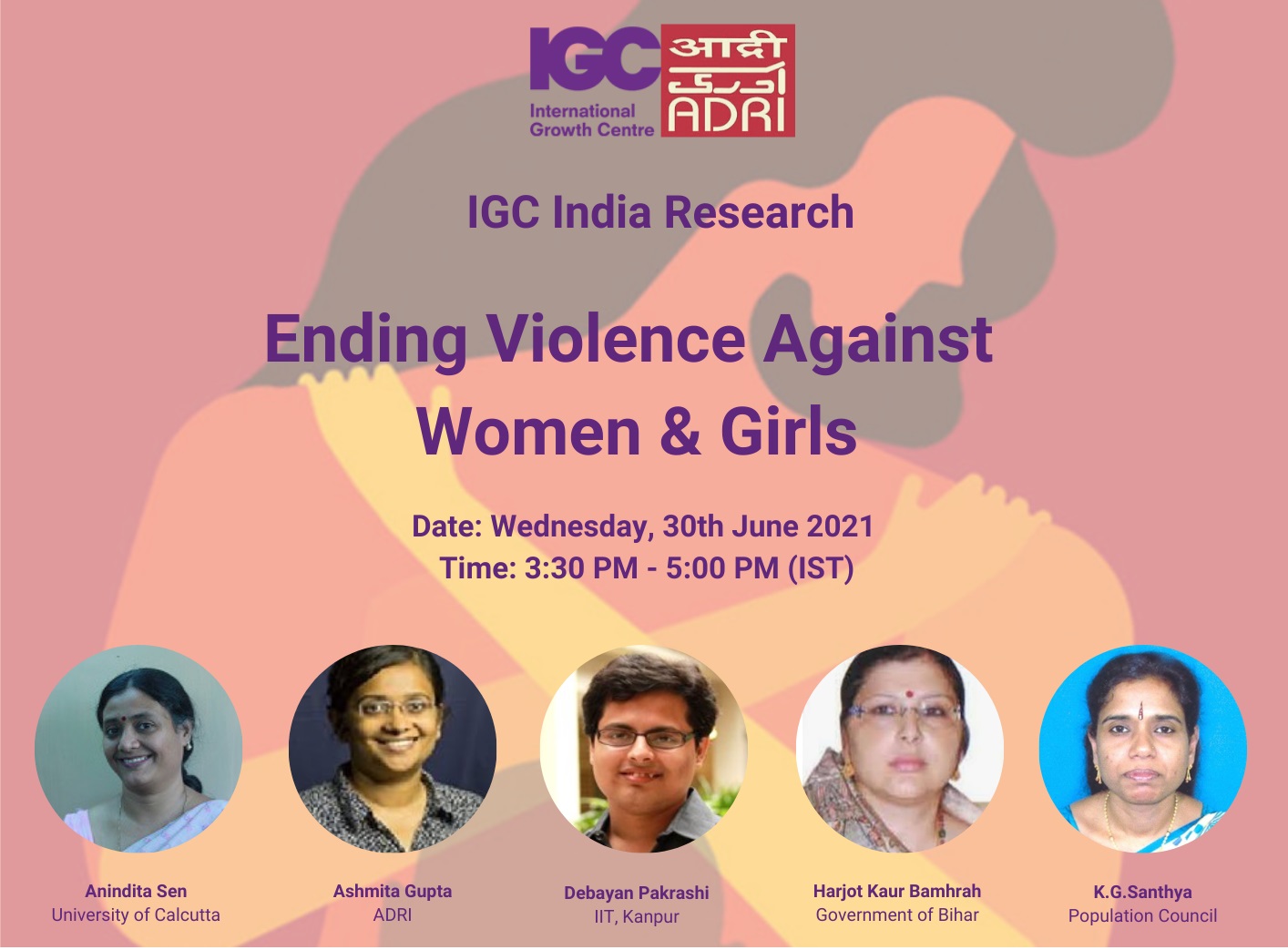Events of IGC

Brief: As per the UN, about one-third of women worldwide have been subject to physical and/or sexual violence by an intimate partner. Around 18% of women and girls, aged 15 to 49 years, who have ever been in a relationship have experienced physical violence by an intimate partner in the previous 12 months (UN, 2020). Furthermore, the COVID19 pandemic has exacerbated the violence against women and girls particularly the rise in domestic violence cases. Data from National Commission of Women shows that in India over 2,300 domestic violence complaints were filed between January and May in 2021, the highest for any year since the year 2000 (The Hindu, 2021).
International Growth Centre has aimed to generate new evidence, in the context of Bihar, to understand this precarity of the issue further. The webinar aims to explore the issues around child marriage with focus on women’s security, gender transformative programmes to instil positive notions of masculinity in boys, and impact of knowledge dissemination and awareness programs to help deter crimes against women.
To bring together different perspectives focused on women’s security and to end violence against women and girls within the context of India, International Growth Centre of London School of Economics and Asian Development Research Institute will organise a Webinar on “Ending Violence Against Women and Girls” on 30th June 2021 at 3:30 PM (IST).
Panelist - Anindita Sen (University of Calcutta), Ashmita Gupta (ADRI), Debayan Pakrashi (IIT, Kanpur), Harjot Kaur Bamhrah (WDC, Government of Bihar), K G Santhya (Population Council)
Date and Time: 30th June 2021 at 15.30 to 17.00 (IST)
Zoom Link : Register
Patna, 30 June. International Growth Centre of London School of Economics and Asian Development Research Institute organised a webinar on Ending Violence Against Women and Girls on June 30th 2021. The panel was moderated by Ashmita Gupta, who shared global statistics on Violence Against Women (VAW) that states that one-in-three women worldwide have experienced intimate partner violence (IPV) in their lifetime (WHO, 2017). COVID-19 has already posed challenges to women and children. Since the mandatory lockdown has been imposed, the early data from National Commission of Women (NCW) showed that VAW is exponentially rising throughout India.
Anindita Sen and Arijita Dutta shared the findings of their research on “Child marriage in Bihar: The role of insecurity and migration”. This problem is most acute in Bihar, with 43.4 percent of the girls getting married before eighteen in the rural areas. Govt of Bihar is aware of this problem and has taken steps like introducing Mukhya Mantri Kanya Vivah Yojana in 2008 and recently Kanya Uthyan Yojana, but the problem persists. However, lack of awareness and visibility is a barrier in terms of policy implementation on ground. Drawing insights from their research, some of the suggestions the researchers mentioned were to increase visibility and awareness of government schemes, focus on education till eighteen – access to schools as well as demand; give incentives to continue education till 18 like the Kanyashree Prakalpa scheme in West Bengal. The survey on social mindset shows -believing that women should stay at home isn’t something people would like to admit; Additionally, believing in love marriage isn’t something they would like to admit in public. The researchers shared their thoughts on the need to build up a narrative to change social mind-set regarding the role of women and marriage norms.
Debayan Pakrashi shared his study on “Knowledge is power: A scoping study on women’s safety”. He highlighted that an increase in knowledge index was seen across awareness only and awareness & training groups. The results also indicate that confidence to fight back increased and an increase in motivation to pursue higher education and career. Based on his research findings, he suggested that the government should fund training programs which focus on both – awareness drive and self-defense and adolescent girls as drivers of information dissemination. Mandatory awareness drive and self-defense training programs in schools.
K.G.Santhya shared the details of her research titled “Assessing the long-term effects of participation in a gender transformative programme in adolescence: A follow-up study of young men in Bihar”. The study focused on the “Do Kadam” intervention for boys aged 13-21 which aimed towards development of gender-transformative life skills curriculum, capacity building of peer mentors for imparting the curriculum and community events. Findings suggest that there was a sustained impact on young men’ gender role attitudes and attitudes about VAWG, five years after the completion of the intervention these positive shifts were sustained, although the effect size was reduced. It also helped reduce intimate partner violence. Regular exposure is the key and early exposure is advocated. Gender-egalitarian attitudes were higher among boys exposed to "Do Kadam" intervention in early adolescence than late adolescence.
The vote of thanks was given by Professor Prabhat P Ghosh, Member Secretary, ADRI.